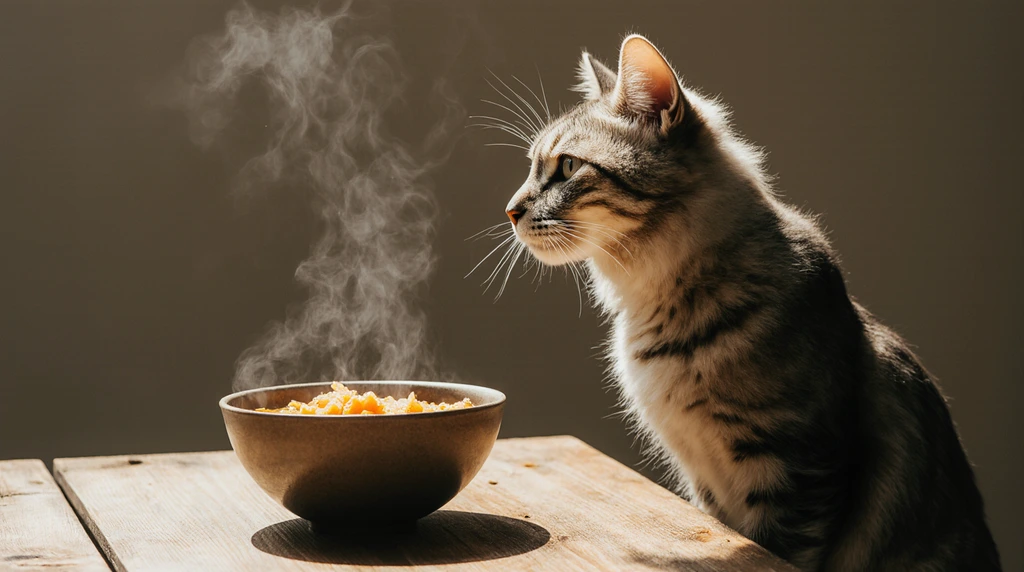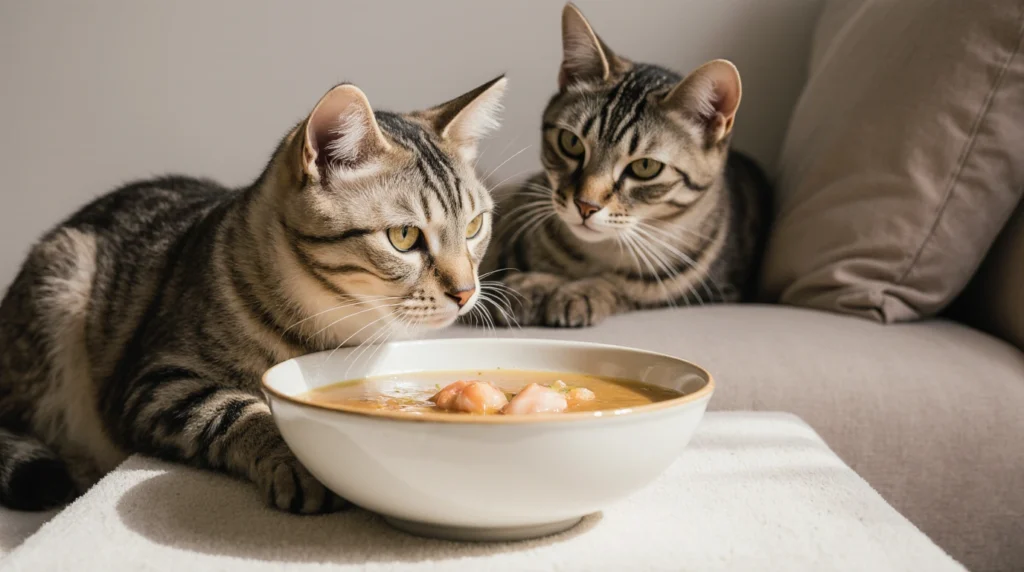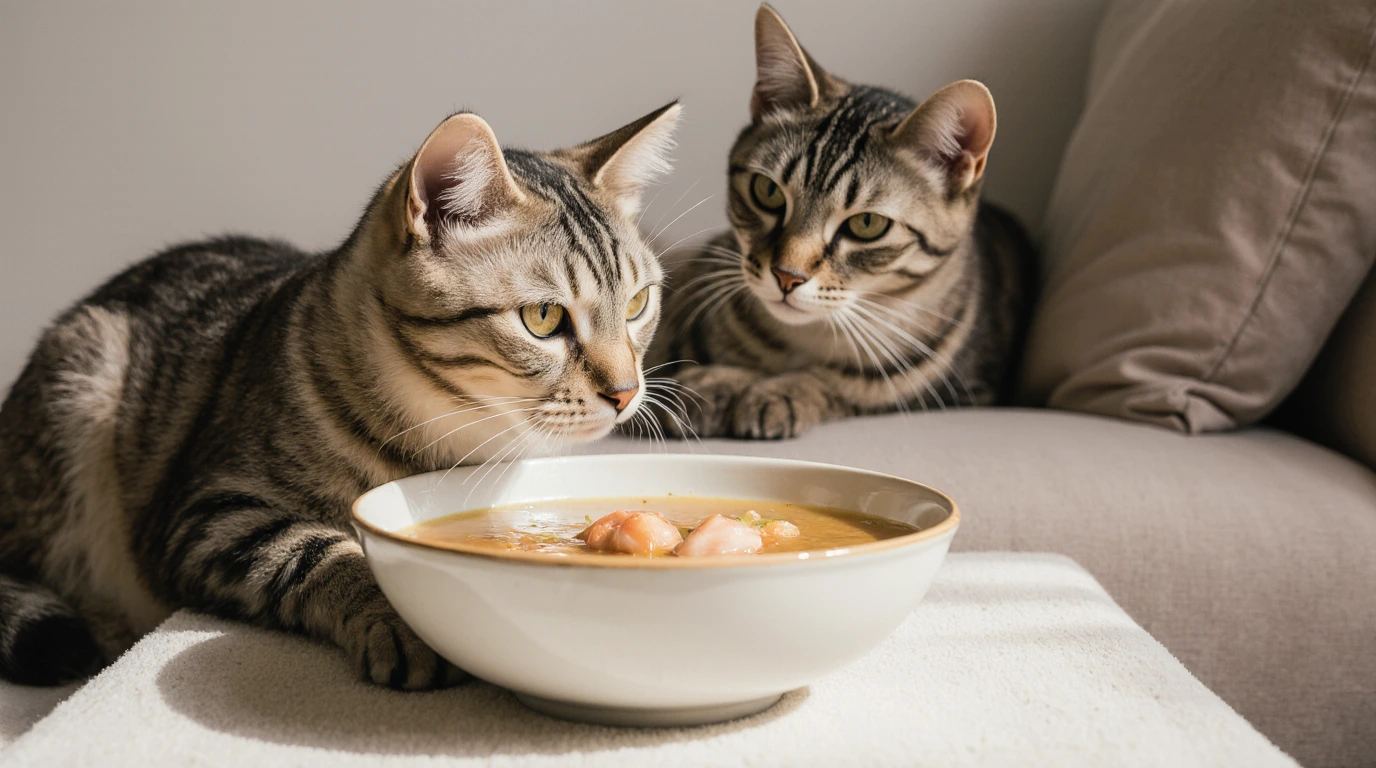Chicken Broth for Cats: Vet Tips & Recipes
You’ve probably stood in your kitchen, ladle in hand, wondering: “Can I share this comforting chicken broth with my cat?” You’re not alone. Pet parents across the U.S. are rethinking how they nourish their cats—especially when those cats are picky eaters, recovering from illness, or simply looking up with those persuasive eyes during dinner prep. The idea of adding a warm, savory boost to their bowl seems harmless—maybe even helpful.
But here’s the catch: not all broths are safe for felines. While chicken broth can be a wonderful way to hydrate and entice cats to eat, there are hidden ingredients and subtle dangers in many store-bought versions that most owners never consider. And on the flip side, some broths—especially homemade, cat-safe ones—can genuinely support digestion, hydration, and appetite in a way dry kibble just can’t.
In this guide, we’ll walk you through everything you need to know about chicken broth for cats. From safety tips and vet-backed benefits to simple homemade recipes and the best ready-made options, you’ll leave with clear, confident answers—and maybe a new favorite food topper your cat actually loves.
Table of Contents

chicken broth for cats. Is Chicken Broth Safe for Cats?
Let’s get this out of the way first—yes, chicken broth can be safe for cats, but only if it’s the right kind. That’s where most pet owners get tripped up. The broth you find in your pantry—rich, salty, full of onions and garlic—is a no-go. Cats have very different tolerances than we do, and ingredients that seem innocent to us can be toxic to them, even in small doses.
Ingredients to Watch Out For
Here’s what to avoid at all costs:
- Onions and garlic: Even trace amounts can damage a cat’s red blood cells.
- Salt (sodium): Most commercial broths are packed with salt, which can strain feline kidneys.
- Artificial flavorings or spices: Anything unrecognizable on the label is probably not cat-friendly.
You’re probably wondering, “Isn’t all broth just water and chicken?” Not quite. Many pre-made broths—even organic ones—contain additives meant to appeal to human palates. And that’s exactly the problem: your cat isn’t human.
What Makes a Broth Cat-Safe?
A truly safe chicken broth for cats should have:
- Only two or three ingredients: chicken, water, maybe a small amount of plain carrot or celery.
- No added salt or seasoning.
- Low or no fat content—cats don’t need oily broth.
- Ideally, slow-cooked or simmered to extract natural nutrients like collagen.
Homemade broth is almost always the safest route because you control every ingredient. But there are also a few commercial options made specifically for cats—more on that in a later section.
What Vets Say About Chicken Broth for Cats
Most vets agree that chicken broth can be a helpful hydration booster or appetite stimulant, especially for cats recovering from surgery or illness. But they’re quick to caution: it should never replace a balanced diet. Think of it as a sidekick—not the main course.
FAQ: Is store-bought chicken broth okay for cats?
Short answer: Usually not. Unless it’s a cat-specific product, most store-bought broths contain onion, garlic, or high sodium levels—making them potentially harmful to cats. Always check the label, or opt for vet-recommended brands or homemade versions.
Health Benefits of Chicken Broth for Cats
Let’s be honest—cats can be drama queens when it comes to food. One day they love their kibble; the next, they stare at it like you’ve offended them personally. That’s where chicken broth can work a little magic—not just by tempting their taste buds, but by supporting their health in ways dry food alone can’t.
Why Broth Can Be a Game-Changer
At its core, chicken broth is hydration with flavor. And for cats—especially those on dry diets or prone to urinary issues—extra moisture can make a huge difference.
Here’s what broth brings to the table:
- Hydration helper: Cats often don’t drink enough water. Broth sneaks hydration into their diet in a form they’ll actually enjoy.
- Appetite stimulant: The warm, savory aroma of broth can entice picky eaters or elderly cats to eat more consistently.
- Digestive support: Gentle on the stomach, broth can soothe digestive issues or encourage eating during recovery from illness.
- Joint & skin boost (if it’s bone broth): Rich in collagen and gelatin, bone-based broths may help support joint health and coat condition.
Not all broths offer the same benefits though—bone broth, when properly prepared, carries additional nutrients like amino acids and trace minerals that go beyond hydration.
Chicken Broth vs. Bone Broth — Which Is Better?
Chicken broth is typically just meat and water. Bone broth, on the other hand, is simmered longer with bones and cartilage, which extracts collagen and glucosamine—great for senior cats or those with joint issues. Just be careful: even bone broth must be free from seasonings and onions.
FAQ: Can chicken broth help sick or senior cats eat more?
Yes—gently warming chicken broth can stimulate appetite, especially in aging or ill cats. Its scent and flavor often encourage eating when regular food is rejected. Always confirm with your vet first, particularly if your cat has kidney or heart conditions.

How to Make Homemade Chicken Broth for Cats
If you’ve ever read the label on a store-bought broth and felt your eyebrows rise at “yeast extract” or “natural flavoring,” you’re not alone. The best way to ensure your cat’s broth is genuinely safe? Make it yourself. It’s simpler than you think—no fancy ingredients, no stress, and total peace of mind.
Step-by-Step Recipe for Cat-Safe Chicken Broth
Here’s a basic recipe that’s been vet-approved and feline-tested (well, unofficially—by cats who licked the bowl clean).
Ingredients: chicken broth for cats.
- 1–2 boneless, skinless chicken thighs (or a mix of thigh and neck bones)
- 4 cups of water
- Optional: 1–2 slices of plain carrot or celery (for nutrients, not flavor)
- That’s it. No salt. No onions. No garlic. No herbs.
Instructions: chicken broth for cats.
- Place the chicken (and bones if using) in a pot with 4 cups of water.
- Bring to a gentle boil, then reduce to a low simmer.
- Simmer uncovered for 1.5 to 2 hours.
- Let cool, then strain thoroughly—remove all bones, fat, and veggie chunks.
- Refrigerate. The fat will solidify at the top—scrape it off before serving.
What you’re left with is a light, nutritious broth your cat can sip solo or enjoy poured over food.
Storage & Serving Tips
- Store in the fridge for up to 4 days.
- Freeze in ice cube trays for single-serve portions.
- Warm slightly before serving (never hot—think bathwater temp).
- Start with a tablespoon or two over meals, and monitor your cat’s reaction.
Consistency and simplicity are key here. You don’t want to overload the broth with vitamins, oils, or complex veggies—this isn’t a human detox soup; it’s feline TLC.
FAQ: How long does homemade chicken broth last in the fridge?
Answer: You can safely store it in an airtight container for up to 4 days in the fridge. For longer storage, freeze it in cubes and use within 2 months.
Best Store-Bought Chicken Broths for Cats
Let’s face it: not everyone has the time—or patience—to simmer chicken for hours. And that’s okay. The good news is, there are a growing number of cat-safe chicken broths available in stores and online. The not-so-good news? Most broths marketed to humans still contain ingredients that can harm your cat.
So, if you’re going store-bought, you need to be picky. Here’s how to choose wisely—and a few products that are already doing it right.
What to Look for in a Commercial Broth
Use this quick checklist:
- ✅ No onion or garlic (check for “natural flavorings” that hide them)
- ✅ Low or no sodium (ideally under 50 mg per serving)
- ✅ No preservatives or flavor enhancers
- ✅ Labeled as pet-safe or feline-friendly
Bonus points if it’s bone broth and includes collagen or amino acids.
Top-Rated Cat-Specific Chicken Broths chicken broth for cats.
Here are a few broth brands that are trusted by cat parents—and pass the ingredient test:
- PureBites+ Chicken Broth for Cats
- Made specifically for felines
- Single-ingredient simplicity: chicken & water
- Low sodium, no fillers
- Great for hydration or pouring over dry food
- Open Farm Bone Broth for Cats
- Human-grade, ethically sourced
- Includes turmeric and pumpkin for digestion (safe in small amounts)
- A bit pricier, but high quality
- Nulo FreeStyle Broth Toppers
- Available in chicken or turkey flavor
- Packed in convenient pouches
- Added vitamins and minerals (check with vet for sensitive cats)
Tip: These are often sold in pet stores or on Amazon/Chewy. Always read the label—brands can change formulas.

Comparison Table of Top Broths (chicken broth for cats)
| Brand | Ingredients | Sodium | Safe for Cats | Bonus Feature |
|---|---|---|---|---|
| PureBites | Chicken, Water | Low | ✅ | High palatability |
| Open Farm | Chicken, Veggies | Low | ✅ | Bone broth base |
| Nulo FreeStyle | Chicken, Nutrients | Moderate | ✅ | Added vitamins |
FAQ: What’s the difference between cat-specific broth and regular broth?
Answer: Cat-specific broths are formulated without harmful ingredients like onion, garlic, or excessive salt. Regular broths—even organic ones—are made for humans, not pets. Unless it says “pet-safe,” assume it’s not.
How Much Chicken Broth Should You Give Your Cat?
Here’s the part where well-meaning cat parents often overdo it. Yes, chicken broth can be helpful—but only in small, controlled amounts. Just like treats, too much of a good thing can mess with your cat’s nutrition balance, especially if you’re not using a broth specifically made for pets.
How Much Is Safe? chicken broth for cats.
Start small. For most cats, 1 to 2 tablespoons per day is more than enough. Think of broth as a supplement, not a replacement for their regular diet. A little poured over kibble or mixed into wet food is usually enough to boost moisture and flavor.
If your cat is on a prescription diet or has health conditions (like kidney disease, heart issues, or food sensitivities), always check with your vet before adding anything—even something as simple as broth.
Signs You’re Overdoing It
Even a safe broth can cause issues if overused. Watch out for:
- Loose stools or upset stomach
- Sudden disinterest in regular food (if they’re just licking up the broth)
- Excessive thirst or urination (especially if sodium is too high)
The best rule? Less is more—and moderation is key.
FAQ: Can cats have chicken broth every day?
Answer: Yes, but only in small quantities and only if it’s a safe, unsalted, and onion-free broth. Daily use is fine for hydration or appetite stimulation, but it should not become a major calorie source or dietary staple.
Frequently Asked Questions (FAQs) chicken broth for cats.
Let’s tackle some of the most common—and surprisingly tricky—questions cat owners have when it comes to chicken broth. If you’ve had a “wait… what about this?” moment, you’re not alone.
Can kittens have chicken broth?
Yes—but only in very small amounts and only if it’s completely safe (no onion, garlic, or added salt). Kittens have sensitive digestive systems, so if you’re using broth to help with weaning or hydration, start with just a teaspoon mixed into food and observe for any signs of upset.
Is store-bought broth okay if it says “organic” or “natural”?
Nope—not automatically. “Organic” and “natural” don’t mean safe for cats. Many organic broths still contain garlic, onion powder, or high sodium levels. Always check the label—or better yet, stick to broths made specifically for pets.
Can I use chicken stock instead of broth?
Stock tends to be more concentrated, fattier, and sometimes seasoned—so it’s even riskier than regular broth unless you’ve made it yourself with no harmful ingredients. Broth is the safer bet for cats, especially if you’re not 100% sure what went into the pot.
Can I freeze chicken broth in cubes for my cat?
Absolutely—and it’s actually one of the best ways to store it. Freeze broth in ice cube trays, then thaw a cube as needed. It’s portion-controlled, mess-free, and ideal for occasional use.
Is bone broth or regular broth better for cats?
Bone broth offers more nutrients—like collagen and amino acids—which may support joint health and skin. But both are useful. If you’re making it at home or buying a pet-safe version, bone broth gives a nutritional edge… but regular chicken broth is still great for hydration and appetite.
Conclusion: chicken broth for cats.
A Small Sip with Big Benefits
Chicken broth for cats might seem like a small dietary tweak—but when done right, it can be a surprisingly powerful tool. From coaxing a finicky eater back to the bowl, to boosting hydration in a cat who stubbornly avoids their water dish, the right broth can bridge nutritional gaps without fuss.
Still, the key word is right. Not all broths are created equal. The wrong ingredients—onion, garlic, salt—can quietly sabotage your good intentions. But with a little label reading (or a quick homemade simmer), you can serve your cat something safe, nourishing, and even comforting.
So whether you’re warming a homemade cube for an elderly tabby or drizzling store-bought broth over dry kibble, you’re not just feeding your cat—you’re caring for them in the smallest, most thoughtful way. And that, honestly, is what being a great cat parent is all about.

